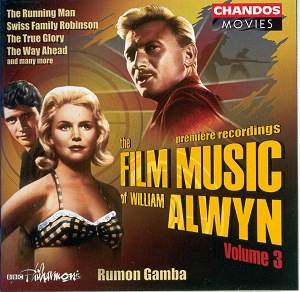Len Mullenger conceived
Musicweb International in its first
incarnation as a website dedicated to
the then (1996) neglected composer William
Alwyn. At that stage it would have
seemed beyond the realms of all probability
that here in 2006, we would have not
one but two cycles of Alwyn’s orchestral
music emerging on two of our most enterprising
independent record labels.
As Chandos release
their third Alwyn film music volume,
Naxos are busy completing their cycle
of the symphonies in the safe hands
of David Lloyd-Jones. In these days
of commercial uncertainty and oft-talked
of artistic indifference how lucky we
are to have Chandos and Naxos and the
single-minded dedication they show to
their cause.
Instrumental in Chandos’s
revival of Alwyn’s film music - all
of which are premiere recordings incidentally
and being heard for the first time outside
the cinema - is the invaluable work
of Philip Lane. His efforts in painstakingly
reconstructing the scores have also
brought the film music of Alan Rawsthorne
to our renewed attention, again on Chandos.
However, coming to
the Alwyn series for the first time,
having missed out on volumes one and
two, it struck me that the best of the
film work could already have been committed
to disc in the earlier volumes. The
likes of Odd Man Out, The
History of Mr Polly and Desert
Victory are amongst the most famous
of the movies Alwyn scored. In this
latest volume it is the strength of
the melodic invention that is in question.
As always the craftsmanship is a model
of its art, the music shaped and constructed
beautifully and scored with a skill
that confirms his earlier neglect to
have been shameful. The doubts arise
from the simple fact that not all of
the principal themes are strong enough
to remain in the memory as they should.
That said much of the
music still possesses the ability to
delight, none more so than in Geordie
of 1955; the story of a teenager
from the Scottish Highlands who becomes
an Olympic hammer-throwing champion
after taking a correspondence course
in physical fitness. Alwyn effectively
weaves in several well known Scottish
folk-tunes to highly attractive effect.
Anyone familiar with his Elizabethan
Dances, will have an idea of the
charm of which he is capable. The wonderful
sense of open air in the movement entitled
Watching the Eagles and the sheer
delight of The Hammer Reel are
amongst the highlights of a six movement
suite that brims with highland atmosphere.
Alwyn wrote the music
for three Walt Disney films of which
Swiss Family Robinson was the
most popular as well as having proved
to be the most enduring. Dating from
1960 the music is here presented as
a three movement suite, the opening
Main Titles capturing the swirling
drama of the storm that was to leave
the family famously shipwrecked. At
Home describes in tender terms the
comfort of the existence the family
finds for themselves on the island.
A charming, romantic violin solo portrays
the romantic interludes between father
and mother: John Mills and Dorothy McGuire.
The third movement depicts, in a highly
typical Alwyn waltz, the family swinging
from tree ropes, preceded by one of
the most famous scenes from the film
as the children chase an ostrich.
Of the remaining substantial
suites, The Magic Box, Penn
of Pennsylvania and The Running
Man, it is The Running Man
that contains the most striking material.
By 1962 when this film was made, Alwyn’s
music was falling victim to the advent
of a new generation of film composers
whose music provided directors with
a new stylistic approach integrating
elements of jazz and popular music.
As if to illustrate the point the main
title music heard here as the opening
of Alwyn’s suite was never used, being
substituted by the music of the then
up and coming Ron Grainer. It is no
coincidence therefore that this turned
out to be Alwyn’s last score for the
cinema. Both The Magic Box
and Penn of Pennsylvania contain
attractive music although neither contains
the most enduring thematic content on
the disc.
Music from five films
is presented in the form of short marches,
waltzes or extracts that exploit the
principal themes from their respective
movies. The Million Pound Note
is represented by another of Alwyn’s
now familiar waltzes yet despite its
grace and elegance is not Alwyn at his
best. The ebullient March from The
Way Ahead packs a good deal of swaggering
good humour into its brief two minute
duration whilst a further march, this
time from The True Glory, is
more overtly patriotic in character
and as a concert piece is possibly the
more satisfying of the two as a result.
The wistful opening of the Waltz from
The Cure for Love employs a solo
piano, the passage of the music weaving
its way more dreamily than is the case
with most of the other waltzes on the
disc. The most interesting of the shorter
extracts however is Paul’s Last Ride,
drawn from the 1949 film The Rocking
Horse Winner and telling the story
of a young boy who is able to predict
certain race horse winners whilst riding
furiously on his rocking horse. Alwyn
packs tremendous drama and tension into
his music with Philip Lane’s reconstruction
progressing from an eerie opening, to
the breakneck pace of the closing bars
as the boy predicts the winner of the
Derby.
Production values,
as ever with Chandos, are virtually
beyond reproach with the BBC Philharmonic
playing beautifully under Rumon Gamba,
the recorded sound a model of clarity
and balance. Of equal excellence are
the booklet notes by Andrew Peter Knowles,
giving a highly useful synopsis of each
film and appealingly illustrated with
portraits of the film’s stars including
David Niven, Lee Remick and Alan Bates.
Christopher Thomas
see also review
by Ian Lace


